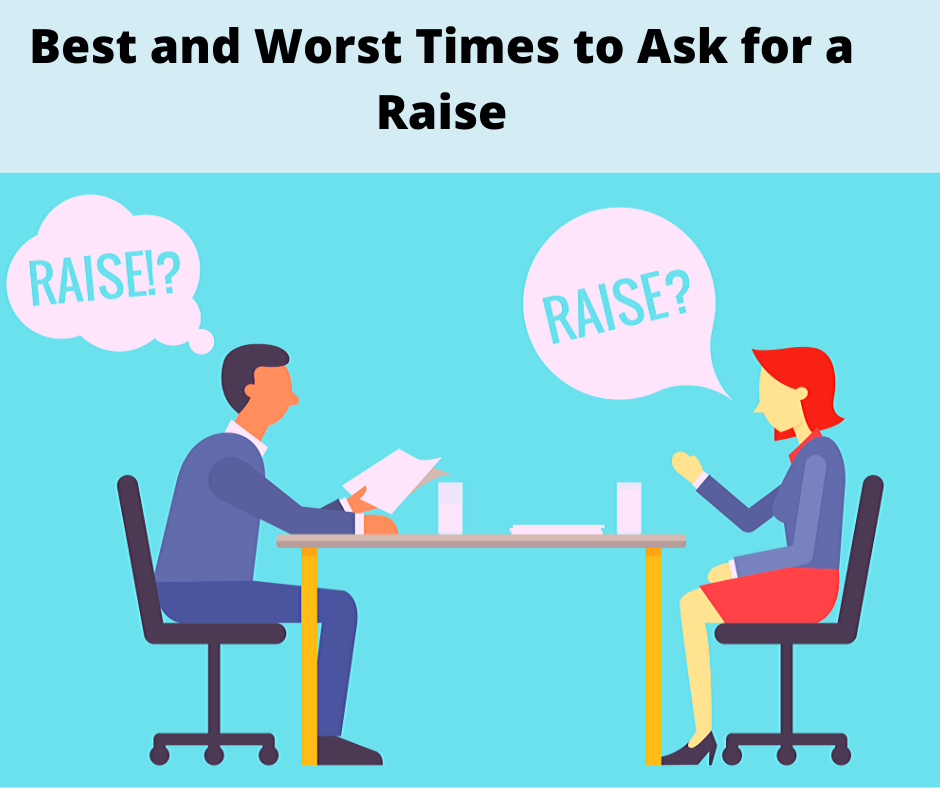No matter how prepared you may be, whether you are still thinking of how to approach your boss for a raise or you have followed the right processes of improving your chances for a raise, the timing makes a huge difference in getting the raise you need.
Believe it or not, there are good and not so good times to talk about money generally not to mention the workplace and that’s why it is important to find the perfect time to talk to your boss about a raise.
First of before you think of asking for a raise you must be sure to have spent at least a year or two in that company with a good performance.
Meanwhile, the focus should not be on how long you have stayed but what impact or value you are adding to the company.
In other words, if your performance is just like every other employee’s performance, then your salary should also be like every other employee’s salary.
If you can say yes to some of these questions below then you are good to go for a raise.

6 Best Times to Ask For A Pay Raise
- When you have more tasks or responsibilities
Taking up more responsibility simply means that you have been given more tasks to do and this may occur when someone leaves or is being laid off and you have to take on the role in addition to yours.
This could come with a lot of stress so it may be the best time to ask for that pay raise (not after the job is done) and trust me, no considerable employer would want to turn you down knowing you are truly worth the raise.
- After a huge project
When you successfully execute a project and maybe save the company a whole lot of money, talking with your boss about the next plan to execute could be a perfect time to chip it in.
After a huge triumph at work, when it is still fresh in the minds of your employers, you can bring up your case for a pay raise.
- During a period of consistently high performance
Another best time to ask for a raise is when you are achieving high results above expectation and it is equally reflecting in the company’s revenue.
Remind them of your outstanding contributions to the company and how you have saved or made money for them; using this case, you stand a chance of winning your boss’s heart.
- At the end of the year, if your department has made more profit for the company.
During the yearly review, when you have assessed yourself and are sure your department has added more value that yielded good fruits in the company, you may present your case for a raise stating your achievements and how you plan to do more in the coming years.
- Before your company’s annual salary budget submission
It would be good to mention your raise cause before the annual salary budget is submitted as it would enable them to decide and add it to the budget so that you don’t get the feedback that the budget for the year is closed so you may have to wait for another year. That’s losing out on quite an amount.
You can also find out the period of time when raises are awarded in your company and present your case two or three months earlier so that it would be considered before the actual time.
- When you have a better offer elsewhere
Sometimes we get offers from other recruiters which could be mouthwatering and we keep thinking “should I leave or stay?” So now there are two ways to this:
The first is if you have been offered double your salary you need to think twice about this. Are you satisfied or unsatisfied with your present company?
If you are satisfied, then you need to be careful with what you say to your employer (you don’t have to mention that you received X2 salary offer elsewhere), rather you can state some of your achievements in the company and also add that the market rate is way above your current salary then give them some other good reasons why they should increase your salary.
So I would advise you request a 50—75% increment instead of a 100. If you are offered something around that then it is good for a company you are satisfied with.
If you are unsatisfied with the company generally, there may be no need to ask for a raise. You can simply accept the other offer and quit responsibly. But you should also weigh other factors like benefits, location (are you moving to a new environment? What’s the cost of living, etc)
Meanwhile, note that you should be careful when asking for a raise for this reason; don’t make them feel you are staying because of the money because your approach may determine how your employers would see you going forward.
Secondly, if the offer is about 20-30% difference from your current salary, you can approach your company and if they are not willing to give in, then you may consider the offer outside.
However, this doesn’t mean salary should be the only reason you should leave your current job, you should also consider career advancement, job security, work-life balance, etc.
4 Worst Times to Ask For A Raise
- As soon as you make your company some money, the first thing that comes to your mind is asking for a raise.
You may start thinking “well I just made them a huge sum of money so this may be the best time to ask”. But let me tell you how your employer will perceive that… it simply means you want a percentage of the money you just made for them.
The best way to approach this is—after some time, you can tell them you have a new plan on how to help them make more money just like you did before. Create a year or two years plan and work through the plan with your boss and share your goals with him/her. When you are able to successfully convince your boss about the plan, tell them you would need a raise to execute the plan.
Now the sense in this is that you are asking for a percentage of the money you are about to make for them in the future.
- One of the times you should never ask for a raise is when the company is not doing well. Timing is very important and this is where sensitivity comes in.
- Don’t approach your boss for a raise when he is not in a good mood or the busiest days of the week (Mondays to Wednesdays), these are very busy days and it won’t be good to distract someone with the raise issue so you can wait till probably Friday.
- Finally, don’t talk about how everyone in the company is earning more than you or about your personal expenses (probably your rent, transport increase, etc).
Most people really don’t care about all that because somehow it really is not their concern.
So I’ll rather you focus on stating your accomplishments in the organization and you can also base your argument on data by talking about the market rate for your job role.
FIND OUT THE MARKET RATE FOR YOUR JOB ROLE HERE
Note that there are some companies that do not give room for “asking for a raise”. Companies that have a fixed salary structure may not be interested in any raise story, this is why employees are advised to read the company’s handbook to be sure of what they’re going into.
However, some other companies also increase employee’s salaries every year probably by 10-15% but this now depends on what you know you are worth.
The salary increase every year may not tally with your workload and using a salary calculator, you may be truly underpaid, so at this point, you may need to ask for what you truly deserve.
Timing matters a lot in everything we do so I will advise you find out the right time to talk to your boss about a raise.
You are the only person who can decide when to go for what you are worth so it is advisable to know the best time to go for it especially when things have changed positively in the workplace but have not reflected in your paycheck.
So think about how much value you are adding to the firm, either in generating revenue, saving costs or bringing in good energy before you make up your mind about requesting for that pay raise.



